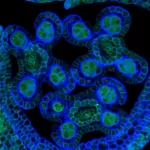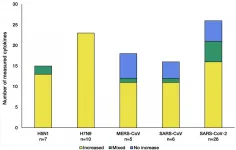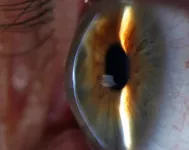Will we enjoy work more once routine tasks are automated? - Not necessarily, a study shows
2021-03-01
(Press-News.org) Will we enjoy our work more once routine tasks are automated? - Not necessarily, suggests a recent study
Research conducted at Åbo Akademi University suggests that when routine work tasks are being replaced with intelligent technologies, the result may be that employees no longer experience their work as meaningful.
Advances in new technologies such as artificial intelligence, robotics and digital applications have recently resurrected discussions and speculations about the future of working life. Researchers predict that new technologies will affect, in particular, routine and structured work tasks. According to estimations, 7-35 percent of work tasks in Finland will be automated over the next 10-20 years or so. Globally, it is anticipated that up to 60 percent of all work tasks will be affected by new technologies.
The discussion has thus far centred around which skills are required in the future working life, or if work as we know it will vanish altogether. A recent study conducted at Åbo Akademi University brings a new perspective to the debate.
"Our values guide many of the selections we make during our lives, including career or occupational choices and the type of competences we value. That's why it is important to understand how the changes brought to work by novel technologies affect future work and if work will correspond to what we today view as meaningful", says Johnny Långstedt, who is a doctoral student in Comparative Religion and a project researcher in Industrial Management at Åbo Akademi University.
Långstedt's study indicates that there is a systematic association between the automatability and the prominent values in various occupations. When structured work is being automated and replaced by other tasks - mainly creative, social and non-regular tasks - the contents of the work may not necessarily fit with the values that have been characteristic of automatable occupations. This could result in a widespread decreased commitment and job satisfaction if the changes at work are as comprehensive as researchers have estimated.
"Up to date, we have mostly talked about how nice it is that routine work is being reduced. But what about those who enjoy such work? This is the first study aimed at understanding the ways our values are linked to the work we are expected to carry out in the future", says Långstedt.
INFORMATION:
Långstedt, Johnny. (2021). How will our Values Fit Future Work? An Empirical Exploration of Basic Values and Susceptibility to Automation. Labour & Industry: a journal of the social and economic relations of work.
More information:
Johnny Långstedt,
Doctoral student in Comparative Religion; Project researcher in Industrial Management, Åbo Akademi University
Tel. +358 40 768 5833
johnny.langstedt@abo.fi
ELSE PRESS RELEASES FROM THIS DATE:
2021-03-01
Home Office data shows the number of police officers voluntarily resigning from the force in England and Wales has more than doubled in the last eight years.
Scant attention has been paid to the reason for this mass exodus. Until now. Researchers from the University of Portsmouth studied government statistics, and discovered the numbers of officers voluntarily resigning from the police service is rising - from 1,158 in the year ending March 2012 to 2,363 in the year ending March 2020. The figure amounts to 1.83 per cent of the total police officer population in England and Wales up from 0.86 per cent eight years ago.
Dr Sarah Charman, from the Institute of Criminal Justice Studies at the University of Portsmouth, led the study. ...
2021-03-01
New research will enhance corona safety during cruises and help cruise lines to again attract passengers onboard
Researchers within Cell Biology and Industrial Management at Åbo Akademi University have developed models aimed at ensuring corona safety during cruises.
The coronavirus pandemic stopped the cruise industry more or less completely. Major international cruise lines, such as Royal Caribbean Group and Carnival Corporation, largely suspended their cruises during 2020, which resulted in practically zero turnover and losses amounting to billions.
Upon assignment by Business Finland, an interdisciplinary research team has been working to find solutions for managing the current crisis ...
2021-03-01
A lot of us recycle our old textiles, but few of us know that they are very difficult to re-use, and often end up in landfills anyway. Now, researchers at Lund University in Sweden have developed a method that converts cotton into sugar, that in turn can be turned into spandex, nylon or ethanol.
WATCH: New method transforms old cotton into glucose
https://www.youtube.com/watch?v=B1V--prLs08
Every year, an estimated 25 million tonnes of cotton textiles are discarded around the world. In total, 100 million tonnes of textiles are thrown out. In Sweden, most of the material goes straight into an incinerator and becomes district heating. In other places, it is even worse, as clothes usually end up in landfills.
"Considering that cotton is a renewable ...
2021-03-01
TAMPA, Fla. - Genetic alterations of the KRAS gene are some of the most common mutations in lung cancer patients, but unfortunately these patients have few effective treatment options. Drugs that target the G12C mutation in KRAS have shown some activity in lung cancer; however, alternative signaling pathways are often activated that bypass the KRAS inhibitor, resulting in drug resistance. In a new article published in Clinical Cancer Research, Moffitt Cancer Center researchers show that various subtypes of lung cancer cells activate different signaling pathways in response to KRASG12C inhibitor treatment. These results may help identify potential combination therapy approaches and guide ...
2021-03-01
Atmospheric carbon dioxide (CO2) is a major driver of global warming, but this gas could also serve as a valuable resource. Researchers at KAUST have developed an efficient catalyst that uses light energy to convert CO2 and hydrogen into methane (CH4). This counteracts the release of CO2 when methane is burned as a fuel.
Many researchers worldwide are exploring ways to convert CO2 into useful carbon-based chemicals, but their efforts have been limited by low efficiencies that restrict the potential for large-scale application.
"Our approach is based on the synergistic combination of light and heat, known as the photothermal effect," says postdoc Diego Mateo. He explains that the heat is generated by the interaction of light with the catalyst, ...
2021-03-01
Spikes in temperature can affect a plant's fertility, resulting in a reduction of yield and economic loss
How plants can protect themselves from stress has been studied by a consortium led by the University of Warwick
Two argonaute-like proteins protect the plant's fertility, understanding these proteins is critical to safeguarding crop production
As Temperatures rise due to global warming the need to protect plants from stressful conditions has increased, as stress can cause a loss in yield and cause further impact economically. A consortium led by the University of Warwick have successfully identified ...
2021-03-01
Respiratory viruses such as SARS-CoV-2 (causing COVID-19) can often catalyse an overactive immune response that leads to a life-threatening cycle, known as a cytokine storm. Analysing cytokine responses from patients infected with SARS-CoV-2 and similar common respiratory viruses has unearthed glaringly important differences in how SARS-CoV-2 affects cytokines compared to other common respiratory viruses.
The comprehensive data resource aims to help specialists identify better treatments and diagnosis of underlying causes that can cause the deadly cytokine storm.
Scientists at the ...
2021-03-01
In order to avoid the occurrence of such effects, the Federal Institute for Health Protection of Consumers and Veterinary Medicine (BgVV) recommended guidance values for maximum THC levels in various food groups in 2000. The guidance value for beverages was given as 0.005 mg/kg, for edible oils with 5 mg/kg and for all other foods with 0.150 mg/kg. In 2018, the BfR came to the conclusion that these values no longer correspond to current scientific knowledge.
Instead, the BfR recommends that the toxicological assessment of hemp-containing foods be carried out on the basis of the acute reference dose (ARfD) of 1 microgram Δ-THC/kg body-weight derived by the European Food Safety Authority (EFSA) in 2015. The ARfD specifies the estimated maximum quantity ...
2021-03-01
DNA nanotechnology - the research field using DNA molecules as building material - has developed rapidly during recent years and enabled the construction of increasingly complex nanostructures. DNA nanostructures, such as DNA origami, serve as an excellent foundation for nanocarrier-based drug delivery applications, and examples of their use in medical treatments have already been demonstrated. Although the stability of such DNA nanostructures under physiological conditions can be improved, little is known about their digestion by endonucleases, which, found everywhere in our blood and tissues, are responsible for destroying foreign DNA in our bodies.
To tackle this emerging question, a ...
2021-03-01
Scientists have taken a significant step forward in their search for the origin of a progressive eye condition which causes sight loss and can lead to corneal transplant.
A new study into keratoconus by an international team of researchers, including a University of Leeds group led by Chris Inglehearn, Professor of Molecular Ophthalmology in the School of Medicine, has for the first time detected DNA variations which could provide clues as to how the disease develops.
Keratoconus causes the cornea, which is?the clear outer layer?at the front of the eye, to thin and bulge outwards into a cone shape over time, resulting in blurred vision and sometimes blindness. It usually emerges in young adulthood, often with lifelong ...
LAST 30 PRESS RELEASES:
[Press-News.org] Will we enjoy work more once routine tasks are automated? - Not necessarily, a study shows


